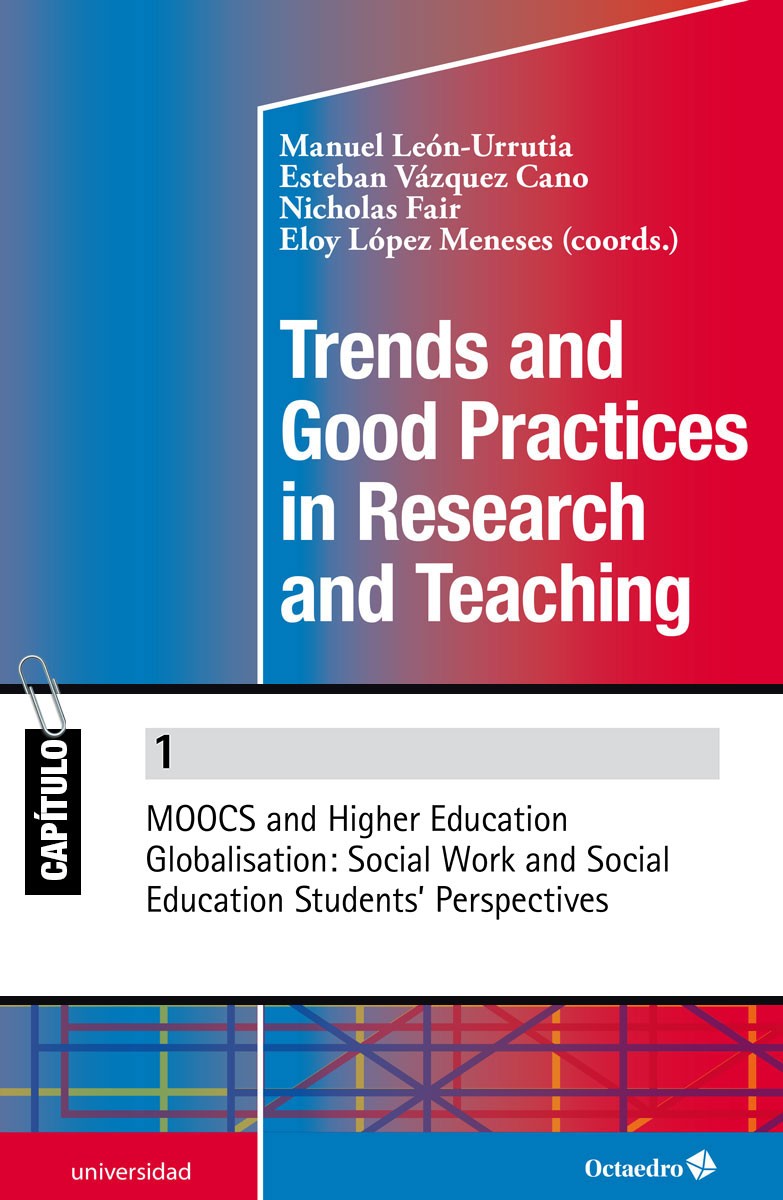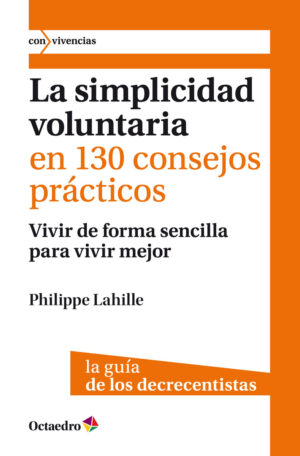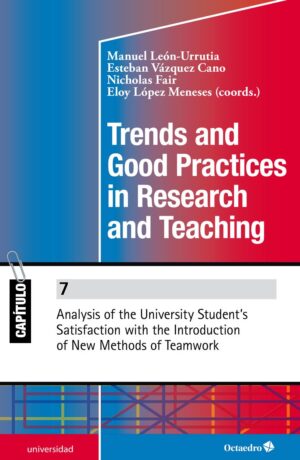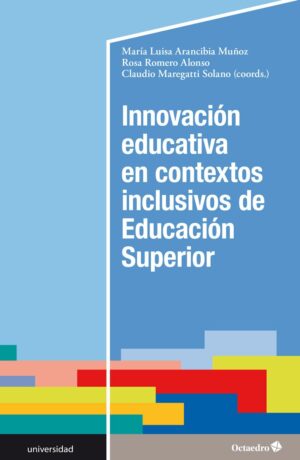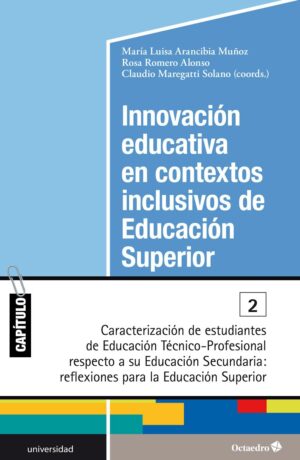FICHA TÉCNICA
Fecha de publicación:
01/01/2020
DOI: https://doi.org/10.36006/16184-01
Título del libro: Trends and Good Practices in Research and Teaching
URL del libro: Trends and Good Practices in Research and Teaching
ISBN:
DOI del libro: https://doi.org/10.36006/16184
Abstract
MOOCs can support educational innovation in a wide range of contexts, from formal to informal and from expected to unexpected. This kind of open online courses are often used within campus modules as core elements of their curriculum. This is the case of this experimental study, where we analyse an experiment of HE educational innovation about the perceptions of students around strengths and weaknesses of MOOCs in socio-educational settings. 54 students were surveyed with multiple choice questions around this topic. The results show that HE students of education degrees tend to see the potential of MOOCs to aid the transformation of the classrooms often currently reserved to social elites. They also see that MOOCs can transcend to new learning arenas more ubiquitous, connected, informal and horizontal, which can facilitate the digital inclusion of disenfranchised groups, as well as potentiate the blooming of interactive communities of collective intelligence. However, these students were also aware of important shortcomings such as the lack of monitoring, and MOOC´s often unattainable demand of high learner autonomy.
Palabras clave
Autores
Cómo citar
León-Urrutia, M., Vázquez Cano, E., Ordóñez Olmedo, E., López Meneses, E. (2019). MOOCS and Higher Education Globalisation: Social Work and Social Education Students’ Perspectives. En León-Urrutia, M., Vázquez Cano, E., Fair, N., López Meneses, E. (coords.) Trends and Good Practices in Research and Teaching. A Spanish-English Collaboration. Barcelona: Octaedro. https://doi.org/10.36006/16184-01
Referencias bibliográficas
- Aguaded, J. I. & Medina-Salguero, R. (2015). Criterios de calidad para la valoración y gestión de MOOC, RIED. Revista Iberoamericana de Educación a Distancia, 18 (2), 119-143. Available at <http://bit.ly/2ql8i71>.
- Aguaded, J. I., Vázquez-Cano, E., & Sevillano, M. L. (2013). MOOCs, ¿turbocapitalismo de redes o altruismo educativo? In SCOPEO INFORME Num. 2: MOOC: Estado de la situación actual, posibilidades, retos y futuro, 74-90. Salamanca: Universidad de Salamanca. Servicio de Innovación y Producción Digital. Available at <http://scopeo.usal.es/wp-content/uploads/2013/06/scopeoi002.pdf>.
- Aguaded, J. I., Vázquez-Cano, E., & López-Meneses, E. (2016). El impacto bibliométrico del movimiento MOOC en la comunidad científica española, Educación XX1, 19 (2), 77-104. doi: <https://doi.org/10.5944/educxx1.19.2>.
- Bogdan, R. & Biklen, S.K. (1992). Investigación cualitativa de la educación. Needham Heights, MA: Allyn and Bacon.
- Cabero, J. & Ruiz-Palmero, J. (2018). Las tecnologías de la información y la comunicación para la inclusión: reformulando la brecha digital, International Journal of Educational Research and Innovation (IJERI), 9, 16-30.
- Calderón, J. J., Ezeiza, A., & Jimeno, M. (2013). La falsa disrupción de los MOOC: la invasión de un modelo obsoleto. VI Congreso Internacional de Educación Abierta y Tecnología Ikasnabar´13, Zalla.
- Castaño, C. & Cabero, J. (2013). Enseñar y aprender en entornos m-learning. Madrid: Síntesis.
- Christensen, G., Steinmetz, B., Alcorn, B., Bennett, A., Woods, D., & Emanuel, E. J. (2013). The MOOC phenomenon: Who takes Massive Open Online Courses and why? Available at <http://bit.ly/2pqRDlv>.
- Clark, D. (2013). MOOCs: taxonomy of 8 types of MOOC.onald Clark Plan B. Available at <http://arkplanb.blogspot.com.es/2013/04/moocs-taxonomy-of-8-types-of-mooc.html>.
- Conner, M. L. (2013). Informal Learning. Available at <http://marciaconner.com/resources/informallearning/>.
- Daniel J. (2012). Making sense of MOOCs: Musings in a Maze of Myth, Paradox and Possibility, Journal of Interactive Media in Education, 3. Available at <http://doi.org/10.5334/2012-18>.
- Daniel, J.; Vázquez-Cano, E., & Gisbert, M. (2015). El futuro de los MOOC: ¿aprendizaje adaptativo o modelo de negocio?, RUSC. Universities and Knowlwdge Society Journal, 12 (1), 64-74.
- Downes, S. (2012). Connectivism and Connective Knowledge Essays on meaning and learning Networks. National Research Council Canada. Available at <http://bit.ly/2oTNdk3>.
- Fidalgo, Á., Sein-Echaluce, M. L., & García-Peñalvo, F. J. (2013). MOOC cooperativo. Una integración entre cMOOC y xMOOC. In Fidalgo, A., Sein-Echaluce, M. L., & Lacleta (eds.) Actas del II Congreso Internacional sobre Aprendizaje, Innovación y Competitividad, CINAIC 2013 (6-8 de noviembre de 2013), pp. 48-486. Madrid, España: Fundación General de la Universidad Politécnica de Madrid.
- Gértrudix, M., Rajas, M., & Álvarez, S. (2017). Metodología de producción para el desarrollo de contenidos audiovisuales y multimedia para MOOC, RIED. Revista Iberoamericana de Educación a Distancia, 20 (1). Available at <http://revistas.uned.es/index.php/ried/article/view/16691/14643>.
- Haggard, S. (2013). The Maturing of the MOOC (Reserch No. 130). London: Department for Business Innovation y Skills-UK Government. Available at <http://bufvc.ac.uk/copyright-guidance/mlr/index.php/site/323>.
- Hollands, F. & Tirthali, D. (2014). MOOCs: Expectations and Reality. Full Report. New York: Columbia University. Available at <http://cbcse.org/wordpress/wp-content/uploads/2014/05/MOOCs_Expectations_and_Reality.pdf>.
- Karsenti, T. (2013). MOOC: Révolution ou simple effet de mode?/The MOOC: Revolution or just a fad?, International Journal of Technologies in Higher Education, 10 (2), 6–37. doi: <https://doi.org/10.7202/1035519ar>.
- Kovanović, V., Joksimović, S., Gašević, D., Siemens, G., & Hatala, M. (2015). What public media reveals about MOOCs: A systematic analysis of news reports, British Journal of Educational Technology, 46 (3), 510-527.
- Lane, J. & Kinser, K. (2013). MOOC´s and the McDonalization of Global Higher Education. The Cronicle of Higer Education. Available at <http://chronicle.com/blogs/worldwise/moocs-mass-educationand-the-mcdonaldization-of-higher-education/30536>.
- León-Urrutia, Vázquez-Cano & López-Meneses (2017). Analítica de aprendizaje en MOOC mediante métricas dinámicas en tiempo real, @tic. Revista d’Innovació Educativa, 18, 38-47. Available at <https://ojs.uv.es/index.php/attic/article/viewFile/10022/9798>.
- López-Meneses, E., Vázquez-Cano, E., & Román, P. (2015). Análisis e implicaciones del impacto del movimiento MOOC en la comunidad científica: JCR y Scopus (2010-13), Comunicar, 44, 73-80. doi: <http://dx.doi.org/10.3916/C44-2015-08>.
- López-Meneses, E. (2017). El fenómeno MOOC y el futuro de la Universidad, Fronteras de la Ciencia, 1, 90-97.
- Martín-Padilla, A. H. (2017). Diseño e implementación de un observatorio de investigación sobre MOOC para la expansión del conocimiento global. (Tesis doctoral inédita). Universidad de Almería, Facultad de Educación, España.
- McAuley, A.; Stewart, B.; Siemens, G., & Cormier, D. (2010). Massive Open Online Courses. Digital ways of knowing and learning. The MOOC Model for Digital Practice. University of Prince Edward Island. Available at <http://davecormier.com/edblog/wp-content/uploads/MOOC_Final.pdf>.
- Miles, M. B. & Huberman, A. (1994). Qualitative data analysis: an expanded sourcebook. Newbury Park, CA: Sage.
- Monje, C. A. (2011). Metodología de la investigación cuantitativa y cualitativa. Guía didáctica. Nieva: Universidad Surcolombiana. Facultad de Ciencias Sociales y Humanas. Programa de Comunicación Social y Periodismo.
- Moser-Mercer, B. (2014). MOOCs in fragile contexts. In Cress, U. & Delgado Kloos, C. (eds.), Proceedings of the European MOOC Stakeholder Summit 2014. Lausan: PAU Education, pp. 114-221. Available at <http://bit.ly/2oQDFW0>.
- Pérez-Parras, J. & Gómez-Galán, J. (2015). International Journal of Educational Excellence, 1 (2), 81-99.
- Ramírez- Fernández, M. B., Salmerón, J. L., & López-Meneses, E. (2015). Comparativa entre instrumentos de evaluación de calidad de cursos MOOC: ADECUR vs Normas UNE 66181:2012, RUSC Universities and Knowledge Society Journal, 12 (1), 131-144. Available at <http://dx.doi.org/10.7238/rusc.v12i1.2258>.
- Rheingold, H. (2013). MOOCs, Hype, and the Precarious State of Higher Ed: Futurist Bryan Alexander. Available at <http://dmlcentral.net/blog/howard-rheingold/moocs-hype-and-precarious-statehigher-ed-futurist-bryan-alexander>.
- Roig-Vila, R., Mengual-Andrés, S. & Suárez-Guerrero, C. (2014). Evaluación de la calidad pedagógica de los MOOC. Revista Profesorado. Currículum y Formación del Profesorado, 18 (1), 27-41. Available at <http://bit.ly/2oB6f2q>.
- Teixeira, A., Mota, J., García-Cabot, A., García López, E., & De-Marcos, L. (2016). Un nuevo enfoque basado en competencias para la personalización de MOOCs en un entorno móvil colaborativo en red, RIED. Revista Iberoamericana de Educación a Distancia, 19 (1), 143-160.
- Valverde, J. (2014). MOOCs: Una visión crítica desde las Ciencias de la Educación, Revista Profesorado. Currículum y Formación del Profesorado, 18 (1), 93-111.
- Vázquez-Cano, E., López-Meneses, E., & Sarasola, J. L. (2013). MOOCs and the Expansion of Open Knowledge. Barcelona: Octaedro.
- Vázquez-Cano, E., López Meneses, E., & Barroso, J. (2015). El futuro de los MOOC: Retos de la formación on-line, masiva y abierta. Madrid: Síntesis.
- White, S., Leon, M., & White, S. (2015, May). MOOCs Inside Universities. In Proceedings of the 7th International Conference on Computer Supported Education, pp. 109-115.
- Zapata, M. (2013). MOOCs, una visión crítica y una alternativa complementaria: la individualización del aprendizaje y de la ayuda pedagógica, Campus Virtuales, II (1), 20-38.
Mostrar referencias bibliográficas
- Aguaded, J. I. & Medina-Salguero, R. (2015). Criterios de calidad para la valoración y gestión de MOOC, RIED. Revista Iberoamericana de Educación a Distancia, 18 (2), 119-143. Available at <http://bit.ly/2ql8i71>.
- Aguaded, J. I., Vázquez-Cano, E., & Sevillano, M. L. (2013). MOOCs, ¿turbocapitalismo de redes o altruismo educativo? In SCOPEO INFORME Num. 2: MOOC: Estado de la situación actual, posibilidades, retos y futuro, 74-90. Salamanca: Universidad de Salamanca. Servicio de Innovación y Producción Digital. Available at <http://scopeo.usal.es/wp-content/uploads/2013/06/scopeoi002.pdf>.
- Aguaded, J. I., Vázquez-Cano, E., & López-Meneses, E. (2016). El impacto bibliométrico del movimiento MOOC en la comunidad científica española, Educación XX1, 19 (2), 77-104. doi: <https://doi.org/10.5944/educxx1.19.2>.
- Bogdan, R. & Biklen, S.K. (1992). Investigación cualitativa de la educación. Needham Heights, MA: Allyn and Bacon.
- Cabero, J. & Ruiz-Palmero, J. (2018). Las tecnologías de la información y la comunicación para la inclusión: reformulando la brecha digital, International Journal of Educational Research and Innovation (IJERI), 9, 16-30.
- Calderón, J. J., Ezeiza, A., & Jimeno, M. (2013). La falsa disrupción de los MOOC: la invasión de un modelo obsoleto. VI Congreso Internacional de Educación Abierta y Tecnología Ikasnabar´13, Zalla.
- Castaño, C. & Cabero, J. (2013). Enseñar y aprender en entornos m-learning. Madrid: Síntesis.
- Christensen, G., Steinmetz, B., Alcorn, B., Bennett, A., Woods, D., & Emanuel, E. J. (2013). The MOOC phenomenon: Who takes Massive Open Online Courses and why? Available at <http://bit.ly/2pqRDlv>.
- Clark, D. (2013). MOOCs: taxonomy of 8 types of MOOC.onald Clark Plan B. Available at <http://arkplanb.blogspot.com.es/2013/04/moocs-taxonomy-of-8-types-of-mooc.html>.
- Conner, M. L. (2013). Informal Learning. Available at <http://marciaconner.com/resources/informallearning/>.
- Daniel J. (2012). Making sense of MOOCs: Musings in a Maze of Myth, Paradox and Possibility, Journal of Interactive Media in Education, 3. Available at <http://doi.org/10.5334/2012-18>.
- Daniel, J.; Vázquez-Cano, E., & Gisbert, M. (2015). El futuro de los MOOC: ¿aprendizaje adaptativo o modelo de negocio?, RUSC. Universities and Knowlwdge Society Journal, 12 (1), 64-74.
- Downes, S. (2012). Connectivism and Connective Knowledge Essays on meaning and learning Networks. National Research Council Canada. Available at <http://bit.ly/2oTNdk3>.
- Fidalgo, Á., Sein-Echaluce, M. L., & García-Peñalvo, F. J. (2013). MOOC cooperativo. Una integración entre cMOOC y xMOOC. In Fidalgo, A., Sein-Echaluce, M. L., & Lacleta (eds.) Actas del II Congreso Internacional sobre Aprendizaje, Innovación y Competitividad, CINAIC 2013 (6-8 de noviembre de 2013), pp. 48-486. Madrid, España: Fundación General de la Universidad Politécnica de Madrid.
- Gértrudix, M., Rajas, M., & Álvarez, S. (2017). Metodología de producción para el desarrollo de contenidos audiovisuales y multimedia para MOOC, RIED. Revista Iberoamericana de Educación a Distancia, 20 (1). Available at <http://revistas.uned.es/index.php/ried/article/view/16691/14643>.
- Haggard, S. (2013). The Maturing of the MOOC (Reserch No. 130). London: Department for Business Innovation y Skills-UK Government. Available at <http://bufvc.ac.uk/copyright-guidance/mlr/index.php/site/323>.
- Hollands, F. & Tirthali, D. (2014). MOOCs: Expectations and Reality. Full Report. New York: Columbia University. Available at <http://cbcse.org/wordpress/wp-content/uploads/2014/05/MOOCs_Expectations_and_Reality.pdf>.
- Karsenti, T. (2013). MOOC: Révolution ou simple effet de mode?/The MOOC: Revolution or just a fad?, International Journal of Technologies in Higher Education, 10 (2), 6–37. doi: <https://doi.org/10.7202/1035519ar>.
- Kovanović, V., Joksimović, S., Gašević, D., Siemens, G., & Hatala, M. (2015). What public media reveals about MOOCs: A systematic analysis of news reports, British Journal of Educational Technology, 46 (3), 510-527.
- Lane, J. & Kinser, K. (2013). MOOC´s and the McDonalization of Global Higher Education. The Cronicle of Higer Education. Available at <http://chronicle.com/blogs/worldwise/moocs-mass-educationand-the-mcdonaldization-of-higher-education/30536>.
- León-Urrutia, Vázquez-Cano & López-Meneses (2017). Analítica de aprendizaje en MOOC mediante métricas dinámicas en tiempo real, @tic. Revista d’Innovació Educativa, 18, 38-47. Available at <https://ojs.uv.es/index.php/attic/article/viewFile/10022/9798>.
- López-Meneses, E., Vázquez-Cano, E., & Román, P. (2015). Análisis e implicaciones del impacto del movimiento MOOC en la comunidad científica: JCR y Scopus (2010-13), Comunicar, 44, 73-80. doi: <http://dx.doi.org/10.3916/C44-2015-08>.
- López-Meneses, E. (2017). El fenómeno MOOC y el futuro de la Universidad, Fronteras de la Ciencia, 1, 90-97.
- Martín-Padilla, A. H. (2017). Diseño e implementación de un observatorio de investigación sobre MOOC para la expansión del conocimiento global. (Tesis doctoral inédita). Universidad de Almería, Facultad de Educación, España.
- McAuley, A.; Stewart, B.; Siemens, G., & Cormier, D. (2010). Massive Open Online Courses. Digital ways of knowing and learning. The MOOC Model for Digital Practice. University of Prince Edward Island. Available at <http://davecormier.com/edblog/wp-content/uploads/MOOC_Final.pdf>.
- Miles, M. B. & Huberman, A. (1994). Qualitative data analysis: an expanded sourcebook. Newbury Park, CA: Sage.
- Monje, C. A. (2011). Metodología de la investigación cuantitativa y cualitativa. Guía didáctica. Nieva: Universidad Surcolombiana. Facultad de Ciencias Sociales y Humanas. Programa de Comunicación Social y Periodismo.
- Moser-Mercer, B. (2014). MOOCs in fragile contexts. In Cress, U. & Delgado Kloos, C. (eds.), Proceedings of the European MOOC Stakeholder Summit 2014. Lausan: PAU Education, pp. 114-221. Available at <http://bit.ly/2oQDFW0>.
- Pérez-Parras, J. & Gómez-Galán, J. (2015). International Journal of Educational Excellence, 1 (2), 81-99.
- Ramírez- Fernández, M. B., Salmerón, J. L., & López-Meneses, E. (2015). Comparativa entre instrumentos de evaluación de calidad de cursos MOOC: ADECUR vs Normas UNE 66181:2012, RUSC Universities and Knowledge Society Journal, 12 (1), 131-144. Available at <http://dx.doi.org/10.7238/rusc.v12i1.2258>.
- Rheingold, H. (2013). MOOCs, Hype, and the Precarious State of Higher Ed: Futurist Bryan Alexander. Available at <http://dmlcentral.net/blog/howard-rheingold/moocs-hype-and-precarious-statehigher-ed-futurist-bryan-alexander>.
- Roig-Vila, R., Mengual-Andrés, S. & Suárez-Guerrero, C. (2014). Evaluación de la calidad pedagógica de los MOOC. Revista Profesorado. Currículum y Formación del Profesorado, 18 (1), 27-41. Available at <http://bit.ly/2oB6f2q>.
- Teixeira, A., Mota, J., García-Cabot, A., García López, E., & De-Marcos, L. (2016). Un nuevo enfoque basado en competencias para la personalización de MOOCs en un entorno móvil colaborativo en red, RIED. Revista Iberoamericana de Educación a Distancia, 19 (1), 143-160.
- Valverde, J. (2014). MOOCs: Una visión crítica desde las Ciencias de la Educación, Revista Profesorado. Currículum y Formación del Profesorado, 18 (1), 93-111.
- Vázquez-Cano, E., López-Meneses, E., & Sarasola, J. L. (2013). MOOCs and the Expansion of Open Knowledge. Barcelona: Octaedro.
- Vázquez-Cano, E., López Meneses, E., & Barroso, J. (2015). El futuro de los MOOC: Retos de la formación on-line, masiva y abierta. Madrid: Síntesis.
- White, S., Leon, M., & White, S. (2015, May). MOOCs Inside Universities. In Proceedings of the 7th International Conference on Computer Supported Education, pp. 109-115.
- Zapata, M. (2013). MOOCs, una visión crítica y una alternativa complementaria: la individualización del aprendizaje y de la ayuda pedagógica, Campus Virtuales, II (1), 20-38.
